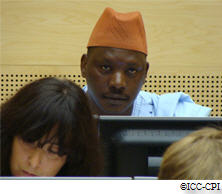
On Friday, 8 October, 2010, the Appeals Chamber of the International Criminal Court (ICC) reversed Trial Chamber I’s decisions to stay proceedings in the case The Prosecutor v. Thomas Lubanga Dyilo, and to release the accused. In accordance with this decision, Mr Lubanga Dyilo will remain in the custody of the Court during the trial proceedings, which can now be resumed.
Trial Chamber I of the ICC had, on 8 July, 2010, ordered to stay the proceedings in the case against Thomas Lubanga Dyilo, considering that the fair trial of the accused was no longer possible because the Prosecution had failed to implement the Chamber’s orders. Trial Chamber I had ordered the Office of the Prosecutor to confidentially disclose to the Defence the names and other necessary identifying information, of intermediary 143. The Prosecution, however, did not comply with these orders. Following the decision to stay the proceedings, Trial Chamber I ordered, on 15 July, the release of the accused. The ICC Prosecutor submitted two appeals against these decisions.
Judge Song, presiding judge in these appeals, delivered a summary of the judgments in open court, and explained that the Appeals Chamber rejects two arguments of the Prosecutor, namely that the Trial Chamber erred when it found that the Prosecutor refused to comply with the Chamber’s orders and that the Trial Chamber misconstrued the Prosecutor’s position with respect to his duties of protecting victims, witnesses and others.
In his oral summary of the judgments, Judge Song stressed that it is undisputed that the Prosecutor did not comply with the orders to disclose the identity of intermediary 143 while ‘orders of the Chambers are binding and should be treated as such by all parties and participants unless and until they are suspended by the Appeals Chamber’. The presiding judge also highlighted that ‘under the Statute, the Trial Chamber, subject only to the powers of the Appeals Chamber, is the ultimate guardian of a fair and expeditious trial’.
The Appeals Chamber considers, however, that the Trial Chamber erred by resorting immediately to a stay of proceedings without first imposing sanctions to bring about the Prosecutor’s compliance with its orders. ‘Sanctions are a key tool for Chambers to maintain control of proceedings within the trial framework and to safeguard a fair trial without having to have recourse to the drastic remedy of staying proceedings’, stated Judge Song in the summary of the judgments.
Finally, the Appeals Chamber also finds that the decision to release Mr Lubanga Dyilo was predicated entirely on the decision to stay proceedings, which is reversed, thus the decision to release the accused must also be reversed.
Thomas Lubanga Dyilo is accused of having committed, as co-perpetrator, war crimes of enlisting and conscripting children under the age of 15 years into the Forces patriotiques pour la libération du Congo (Patriotic Forces for the Liberation of Congo) (FPLC), and using them to participate actively in hostilities in Ituri, a district of the eastern province of the Democratic Republic of the Congo (DRC), between September 2002 and August 2003.
Related articles
- • UN Security Council Calls on Rwanda to Stop Supporting M23 Rebels in DR Congo (February 22, 2025)
- • 'Deadly environment' plus 'political and social' obstacles hinder Ebola fight, Security Council hears (July 24, 2019)
- • Ebola outbreak declared an international Public Health Emergency (July 17, 2019)
- • Jean-Pierre Bemba named MLC presidential candidate (July 13, 2018)
- • At least 30 dead after massacres in Ituri (March 2, 2018)
- • ICC Confirms 14-Year Sentence Against Thomas Lubanga (December 1, 2014)
- • ICC Case Against Bemba Wrapping Up as Another Opens (November 12, 2014)
- • ICC confirms war crimes charges against Bosco Ntaganda (June 10, 2014)
- • ICC sentences Germain Katanga to 12 years (May 23, 2014)
- • ICC finds Germain Katanga guilty of war crimes and crime against humanity (March 7, 2014)
- • Bosco Ntaganda Attacked Civilians on Ethnic Grounds, ICC Prosecutor Says (February 10, 2014)
- • Rebel Leader Bosco Ntaganda Makes First Appearence Before the ICC (March 26, 2013)
- • Bosco Ntaganda in the International Criminal Court's custody (March 22, 2013)
- • Warlord Bosco Ntaganda Turns Himself In at US Embassy in Rwanda (March 18, 2013)
- • International Criminal Court Acquits Mathieu Ngudjolo Chui (December 18, 2012)
- • The M23 Rebels Want to Overthrow Kabila? Nonsense (November 28, 2012)
- • M23 Rebels Committing War Crimes (September 11, 2012)
- • Kagame May Face War Crimes Charges at the ICC, Says US Official (July 26, 2012)
- • US Cuts Military Aid to Rwanda Over Support to Rebels in DR Congo (July 21, 2012)
- • DR Congo, Rwanda Sign Pact to Fight Rebels in Eastern Congo (July 15, 2012)
- • Thomas Lubanga sentenced to 14 years (July 10, 2012)
- • U.S. Tells Rwanda to Stop Supporting Rebels in DR Congo (July 2, 2012)
- • Kagame Is A Problem for The U.S. and The U.K. (June 23, 2012)
- • ICC Prosecutor Seeks 30 Years for Thomas Lubanga (June 13, 2012)
- • Congo Army Advances On Rebels Holdout, Says Official (June 5, 2012)
- • Rwanda Should Stop Aiding War Crimes Suspect Bosco Ntaganda: Human Rights Watch (June 4, 2012)
- • UN Report Accuses Rwanda of Supporting Bosco Ntaganda Rebels (May 28, 2012)
- • ICC Prosecutor Seeks New Charges Against Ntaganda, FDLR Leader (May 14, 2012)
- • Army Suspends Military Operations Against Ntaganda Loyalists (May 6, 2012)
- • Kabila's Position on The Arrest of Ntaganda 'Has Not Changed' (April 13, 2012)







